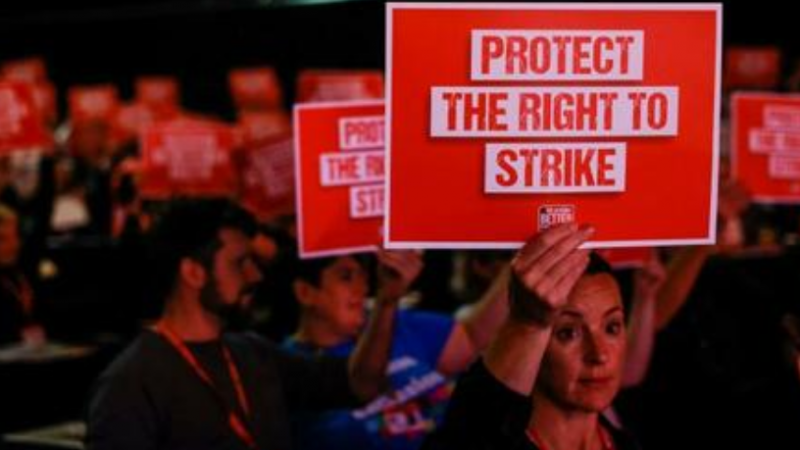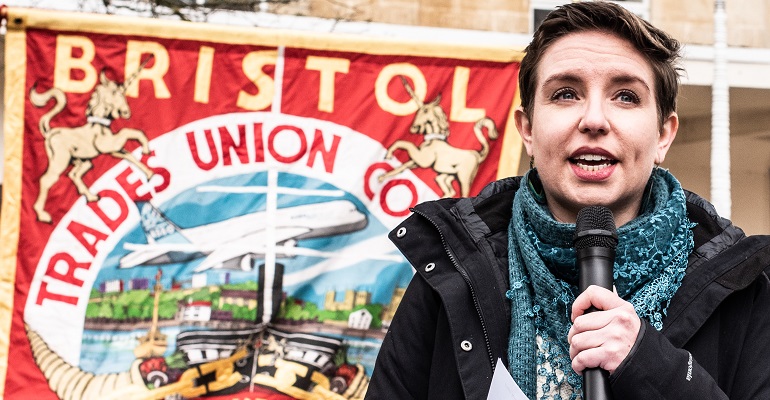Left Foot Forward
Left Foot Forward is recommended, a few recent articles
Anti-strike law: Major protest planned by unions to defend the right to strike

The Trades Union Congress (TUC) has organised an emergency protest on Monday 22nd May for 6.00pm outside Parliament Square, as it fights to protect the right to strike which is under attack from the Tory government.
Mick Lynch from the RMT, Matt Wrack from the FBU and Kevin Courtney will be speaking at the rally, with Unison, USDAW and the PCS union all showing their support.
The government’s strikes bill, which will empower employers to sue unions and sack staff in crucial sectors if minimum service levels aren’t maintained, has been slammed as an attack on the fundamental right to strike and as a draconian piece of legislation. The Bill essentially means that when workers lawfully vote to strike in health, education, fire, transport, border security and nuclear decommissioning, they could be forced to attend work – and sacked if they don’t comply.
The TUC said in a press statement: “We can’t afford to lose the right to strike. But multi-millionaire Tory politicians are attacking our right to strike for better pay and fair treatment at work.
…
Kwasi Kwarteng once more refuses to apologise for economic turmoil he caused
Former Chancellor Kwasi Kwarteng has once more refused to apologise for his disastrous mini-budget which caused financial turmoil and which eventually led to him being sacked and Liz Truss being forced out of office.
Kwarteng, whose mini-budget resulted in chaos on the financial markets, the pound hitting an all-time low against the dollar and mortgage rates soaring, said he was ‘not in the business of forgiveness’.
“I’m not going to apologise,” he told Channel 4 News.
…
Ann Widdecombe’s appalling advice to hungry families struggling with cost of living crisis is condemned
Former Tory MP and now Reform UK party member Ann Widdecombe has been widely condemned for her ‘out of touch’ and appalling comments on families struggling to make ends meet during the cost of living crisis.
Widdecombe was asked on BBC 2’s Politics Live programme about the cost of living crisis and what advice she would give to viewers who could not even afford the basics.
Jo Coburn asked the former Tory MP: “What do you say to those viewers who literally can’t afford to pay even for some of the basics – if they’ve gone up the way that cheese sandwich has, with all its ingredients?”
“Well, then you don’t do the cheese sandwich,” Widdecombe replied.
Her comments were immediately condemned by fellow panellist Rachel Cunliffe who said: “We’re talking about absolute basics and staples. We’re talking about own-brand pasta, we’re talking about bread, we’re talking about families who can’t afford to feed their children.
…
Andy Burnham explains why Labour should back proportional representation
‘The First Past the Post system hands more power to the establishment than MPs or people.’
The Mayor of Greater Manchester, Andy Burnham, has set out the reasons for why the Labour Party should back a change to the voting system in favour of proportional representation (PR), despite party leader Keir Starmer saying that voting reform will not be a priority should Labour win power.
Although the Labour Party conference last year overwhelmingly backed a motion calling on the party to embrace a proportional electoral system, the leadership has made clear that it would not do as the motion says.
Since then, at the Progressive Britain conference last week, Starmer made clear that voting reform would not be among the priorities should Labour win power.
Burnham however has urged the party to adopt PR, saying that the current first-past-the-post voting system hands more power to the establishment than MPs or people and changing the system to proportional representation would mean “every vote would matter”.
…
Green Party sets out 5 ways in which the Tories have undermined our democracy
Carla Denyer claims Greens are the strongest party on democratic reform

The Green Party has slammed the Tories for dragging democracy in the UK in a dangerous direction.
Speaking at an event last night, co-leader of the Green Party of England and Wales, Carla Denyer, laid out how the Tory’s have assaulted our democracy – and how the Greens would solve it.
Denyer discussed how to restore public faith in politics and argued that the Greens were the strongest party on democratic reform.
…
The Greens have said they would apply proportional representation for all elections to all levels of government, along with bringing the voting age down to 16.
They would introduce devolution, mirroring systems in Europe by giving more power to local and regional government and Scottish, Welsh and Northern Irish Parliament. They would also introduce an elected upper house to replace hereditary power in the House of Lord and set up a Citizen’s Convention.
Introducing a fairer system of state funding for political parties, which would hope to eliminate the dependence of large private donations and strengthen transparency on political lobbying and donations. One in four people believe that party donors have the most influence on government decisions, according to Unlock Democracy.
Denyer also accused the media of preventing democratic conversations through its bias towards certain political parties.
…
